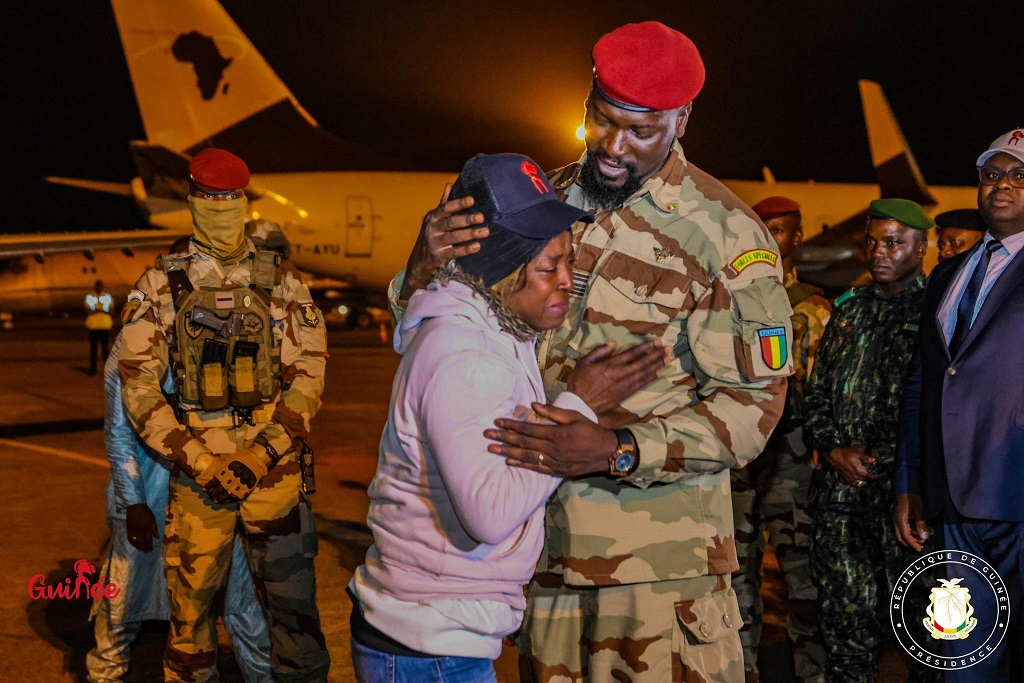In a strong show of support for Guineans fleeing Tunisia, President Mamadi Doumbouya was at the airport in Conakry on 1 March to welcome 49 citizens who were repatriated via a special flight. Colonel Mamadi Doumbouya, who came to power through a coup two years ago, greeted the returnees as they alighted the aircraft.
The flight was organised by by the Guinean government following the outbreak of xenophobic attacks on sub-Saharan Africans in the North African country provoked by the utterances of its president, Kaïs Saïed.
“There is a criminal plan to change the composition of the demographic landscape in Tunisia and some individuals have received large sums of money to give residence to sub-Saharan migrants,” said the head of state in a statement, claiming that black Africans threatened his country’s identity.

At a national security council convened on the subject, President Saïed spoke of “hordes of illegal migrants” whose presence in Tunisia he called a source of “violence, crime and unacceptable acts.” Insisting on “the need to quickly put an end” to this immigration, he equated it with “a desire to make Tunisia just another African country and not a member of the Arab and Islamic world,”
The Tunisian leader’s comments have been widely condemned as racist by the African Union and human rights organizations.
Following the lead of the country’s leader, xenophobic and racist remarks about Black people have become prominent in the Tunisian media with many commentators calling for the deportation of sub-Saharan migrants. In fact, a nationalist group has launched an online petition to press for the deportation. Reports of physical attacks on Black people have been increasing for several days.
Many have been evicted by landlords, robbed on the street or prevented from using public transport. In addition, according to the organisation “Lawyers without Borders” (ASF), the security forces have arrested an exceptionally high number of migrants since the beginning of February.
In addition to the Guineans who have returned to their home country, 145 citizens of the Ivory Coast (Côte d Ivoire) returned home on Saturday. Among them were 30 students, according to the Association of Ivorian Students in Tunisia. A total of around 1,500 people were registered for return at the Côte d Ivoire embassy, it said. Other African countries such as Gabon, Mali and Burkina Faso are also registering people to return..
The fears stoked by President Kaïs Saïed are similar to those promoted by the “great replacement” theory canvassed by the far right who are warning Europeans to the large presence of Muslim Arabs and Turks in their countries.
Tunisia, with a population of 12 million people, has between 30,000 and 50,000 sub-Saharan migrants, according to local NGOs. The country is actually a transit for most of them as their ultimate goal is Europe, say analysts. Last year, half of the 22,000 migrants who arrived irregularly in Europe from Tunisia were of sub-Saharan origin.
Adira Kallo
 THE AFRICAN COURIER. Reporting Africa and its Diaspora! The African Courier is an international magazine published in Germany to report on Africa and the Diaspora African experience. The first issue of the bimonthly magazine appeared on the newsstands on 15 February 1998. The African Courier is a communication forum for European-African political, economic and cultural exchanges, and a voice for Africa in Europe.
THE AFRICAN COURIER. Reporting Africa and its Diaspora! The African Courier is an international magazine published in Germany to report on Africa and the Diaspora African experience. The first issue of the bimonthly magazine appeared on the newsstands on 15 February 1998. The African Courier is a communication forum for European-African political, economic and cultural exchanges, and a voice for Africa in Europe.




















